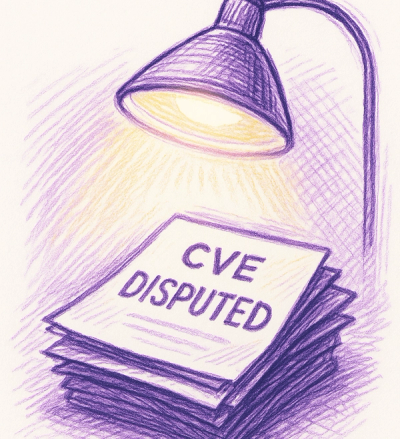
Security News
Google’s OSV Fix Just Added 500+ New Advisories — All Thanks to One Small Policy Change
A data handling bug in OSV.dev caused disputed CVEs to disappear from vulnerability feeds until a recent fix restored over 500 advisories.
@anthropic-ai/dxt
Advanced tools
Desktop Extensions (.dxt) are zip archives containing a local MCP server and a manifest.json that describes the server and its capabilities. The format is spiritually similar to Chrome extensions (.crx) or VS Code extensions (.vsix), enabling end users to install local MCP servers with a single click.
This repository provides three components: The extension specification in MANIFEST.md, a CLI tool for creating extensions (see CLI.md), and the code used by Claude for macOS and Windows to load and verify DXT extensions (src/index.ts).
Claude for macOS and Windows uses the code in this repository to enable single-click installation of local MCP servers, including a number of end user-friendly features - such as automatic updates, easy configuration of MCP servers and the variables and parameters they need, and a curated directory. We are committed to the open ecosystem around MCP servers and believe that its ability to be universally adopted by multiple applications and services has benefits developers aiming to connect AI tools to other apps and services. Consequently, we’re open-sourcing the Desktop Extension specification, toolchain, and the schemas and key functions used by Claude for macOS and Windows to implement its own support of Desktop Extensions. It is our hope that the dxt format doesn’t just make local MCP servers more portable for Claude, but other AI desktop applications, too.
At the core, DXT are simple zip files containing your entire MCP server and a manifest.json. Consequently, turning a local MCP server into an extension is straightforward: You just have to put all your required files in a folder, create a manifest.json, and then create an archive.
To make this process easier, this package offers a CLI that helps you with the creation of both the manifest.json and the final .dxt file. To install it, run:
npm install -g @anthropic-ai/dxt
dxt init. This command will guide you through the creation of a manifest.json.dxt pack to create a dxt file.You can find the full spec for the manifest.json and all its mandatory and optional fields in MANIFEST.md. Examples for extensions can be found in examples.
AI tools like Claude Code are particularly good at creating desktop extensions when informed about the spec. When prompting an AI coding tool to build an extension, briefly explain what your extension aims to do - then add the following context to your instructions.
I want to build this as a Desktop Extension, abbreviated as "DXT". Please follow these steps:
- Read the specifications thoroughly:
- https://github.com/anthropics/dxt/blob/main/README.md - DXT architecture overview, capabilities, and integration patterns
- https://github.com/anthropics/dxt/blob/main/MANIFEST.md - Complete extension manifest structure and field definitions
- https://github.com/anthropics/dxt/tree/main/examples - Reference implementations including a "Hello World" example
- Create a proper extension structure:
- Generate a valid manifest.json following the MANIFEST.md spec
- Implement an MCP server using @modelcontextprotocol/sdk with proper tool definitions
- Include proper error handling, security measures, and timeout management
- Follow best development practices:
- Implement proper MCP protocol communication via stdio transport
- Structure tools with clear schemas, validation, and consistent JSON responses
- Make use of the fact that this extension will be running locally
- Add appropriate logging and debugging capabilities
- Include proper documentation and setup instructions
- Test considerations:
- Validate that all tool calls return properly structured responses
- Verify manifest loads correctly and host integration works
Generate complete, production-ready code that can be immediately tested. Focus on defensive programming, clear error messages, and following the exact DXT specifications to ensure compatibility with the ecosystem.
A manifest.json is the only required file.
extension.dxt (ZIP file)
├── manifest.json # Required: Extension metadata and configuration
├── server/ # Server files
│ └── index.js # Main entry point
├── node_modules/ # Bundled dependencies
├── package.json # Optional: NPM package definition
├── icon.png # Optional: Extension icon
└── assets/ # Optional: Additional assets
extension.dxt (ZIP file)
├── manifest.json # Required: Extension metadata and configuration
├── server/ # Server files
│ ├── main.py # Main entry point
│ └── utils.py # Additional modules
├── lib/ # Bundled Python packages
├── requirements.txt # Optional: Python dependencies list
└── icon.png # Optional: Extension icon
extension.dxt (ZIP file)
├── manifest.json # Required: Extension metadata and configuration
├── server/ # Server files
│ ├── my-server # Unix executable
│ ├── my-server.exe # Windows executable
└── icon.png # Optional: Extension icon
Python Extensions:
server/lib/ directoryserver/venv/pip-tools, poetry, or pipenv to create reproducible bundlesPYTHONPATH to include bundled packages via mcp_config.envNode.js Extensions:
npm install --production to create node_modulesnode_modules directory with your extensionnpm ci or yarn install --frozen-lockfile for reproducible buildsserver.entry_pointBinary Extensions:
FAQs
Tools for building Desktop Extensions
We found that @anthropic-ai/dxt demonstrated a healthy version release cadence and project activity because the last version was released less than a year ago. It has 9 open source maintainers collaborating on the project.
Did you know?

Socket for GitHub automatically highlights issues in each pull request and monitors the health of all your open source dependencies. Discover the contents of your packages and block harmful activity before you install or update your dependencies.

Security News
A data handling bug in OSV.dev caused disputed CVEs to disappear from vulnerability feeds until a recent fix restored over 500 advisories.

Research
/Security News
175 malicious npm packages (26k+ downloads) used unpkg CDN to host redirect scripts for a credential-phishing campaign targeting 135+ organizations worldwide.

Security News
Python 3.14 adds template strings, deferred annotations, and subinterpreters, plus free-threaded mode, an experimental JIT, and Sigstore verification.